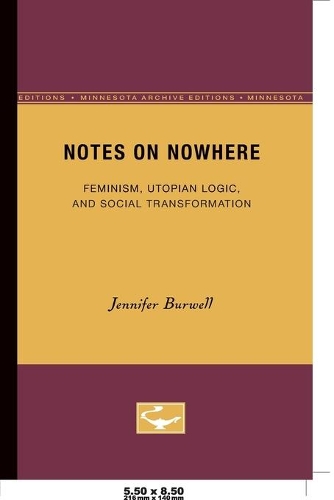
Notes on Nowhere: Feminism, Utopian Logic, and Social Transformation
Publishing Details
Notes on Nowhere: Feminism, Utopian Logic, and Social Transformation
By (Author) Jennifer Burwell
University of Minnesota Press
University of Minnesota Press
15th March 1997
United States
Classifications
Tertiary Education
Non Fiction
Feminism and feminist theory
Literary theory
808.80372
Physical Properties
264
Width 140mm, Height 216mm
Description
The term "utopia" implies both "good place" and "nowhere". Since Sir Thomas More wrote "Utopia" in 1516, the debate over utopian models of society has fallen on all points between these somewhat contradictory definitions. This work engages the literary cross section of contemporary feminist science fiction to examine the tradition of utopian writing. The study provides close readings of the science fiction novels of four feminist writers - Sally Gearhard, Joanna Russ, Marge Piercy and Monique Wittig - and poses questions central to utopian writing: do these texts promote a tradition in which models of the ideal society have been used to hide rather than reveal violence, oppression and social divisions Can a feminist critical utopia offer a departure from this tradition by accepting contradiction and struggle as inevitable aspects of our thoughts about the future What implications do these questions have for those who wish to use these social hypotheses for emancipatory political uses As one way of answering these questions, the text compares the politics of two prevalent characters in utopian writing. The first is the abstract, "revolutionary" subject who contradicts existing conditions. The second, "resistant" subject, is partial, concrete and produced by conditions rather than operating outside of them. In analyzing contemporary changes in the subject's relationship to social space, the work argues in favour of a collective "standpoint approach". By exploring the dilemmas, antagonisms and resolutions within the critical literary feminist utopia, the book creates connections to a similar set of problems and resolutions within "non-literary" discourses of social transformation such as those faced by feminism, gay and lesbian studies and Marxism.
Author Bio
Jennifer Burwell teaches in the Department of English at Ryerson University.
